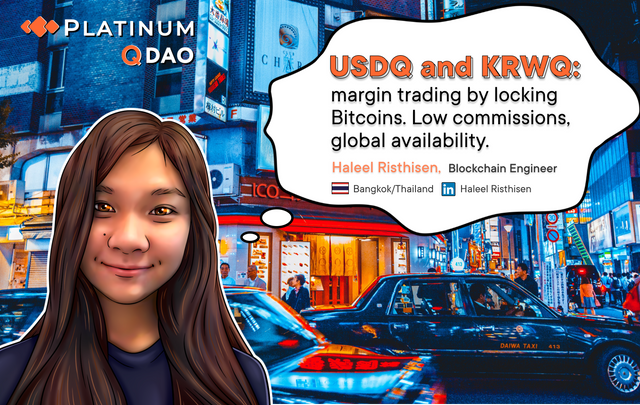Why we don’t need failed fiat stablecoins like USDT? Developers from Platinum Q DAO explains in deep how the ecosystem of stablecoins USDQ and KRWQ works

Haleel Risthisen is an active member of crypto community who has contributed extensively to emerging blockchain-based solutions. She currently works as a Blockchain Engineer at Platinum Q DAO Engineering, leveraging her skills in cryptography and DLT to help develop USDQ, a fully decentralized stablecoin for easy Bitcoin collateralization.
Accustomed to agile and SCRUM environments, she combines a platform-level architecture mind and ability to discern lower-level challenges and bottlenecks, always ready to consult customers on the journey ahead and choices available. Dedicated to delivering superb UI/UX, Haleel works closely with front end development sub-team, smoothing out kinks in implementations, shipping pixel-perfect and usability-first deployments.
Why do you need stable asset cryptocurrencies?
A non-volatile stablecoin is a key step towards realizing the potential of blockchain technology to transfer value online. This means that cryptocurrencies can be used more effectively for traditional financial products such as loans. If you were to take out a loan denominated in BTC or ETH and the value fluctuates between 10% to 20% in 24 hours the sense of choosing it over a fiat-based option does not make much sense. How about if want to send a specific amount for remittance. In only the time it takes for a bitcoin transaction to confirm your crypto could lose value and you may end up paying more as opposed to just paying the fees of remittance services using fiat money. Ever placed a bet on something? You shouldn’t denominate that bet in ether. How about if you are betting on the results of a month-long sports competition? A month from now ether’s price could be quite different from where it’s at now. Lastly, think about using decentralized exchanges, the original dream for cryptocurrency adopters, complete P2P transfers without unnecessary intermediaries valued with the help of non-volatile stable assets and would always allow users to maintain full custody of their own funds being transacted. No hacking situations, no single-point-of-failure scenarios for exchanges losing customers’ funds.
Explanation of the Q DAO System
This will be the most important part of this text. To be able to understand how the Q DAO creates stability for USDQ we will also make definitions for some terminology related to blockchain throughout the sections of this text.
USDQ, the stable asset coin is upheld by collateral guarantees. These collaterals are in the form of crypto (bitcoin to be precise). Let’s imagine you want to use your BTC to generate some USDQ. The first step requires you to send it to a Collateralized Debt Contract (CDC) which basically means that it becomes a value that remains locked by a smart contract as a form of guarantee for the USDQ you receive for it. It is a computer program on the ethereum blockchain whose main function is to make each transaction compliant with the terms of USDQ and the collateral guarantees each user is placing.
How does the Q DAO Ecosystem work?
The ecosystem is built on the notion of smart contracts. Such is the case of the CDP. The Collateralized Debt Position referenced in the paragraph above. Remember, a blockchain gives you a chance to get things done without anyone else involved — no usual intermediaries are needed here. Very identical to how websites allow you to share data without going back and forth with other unnecessary parties. So we can say that blockchains let you share an incentive without a mediator. As you may have heard numerous times this was the original idea for the first decentralized peer-to-peer digital currency known as Bitcoin. Bitcoin allows anyone the ability to send from Point A to Point B without confiding in anybody except yourself. Actually, the trust is not eliminated completely but it is placed on the way the blockchain works. You are putting your confidence in the mechanism used by blockchain to confirm and accept only the valid transactions and operations. Ethereum came along and added more functionalities to this idea of transferring value. It actually allowed users to now be able to send instructions and specific guidelines along with their transfers. And this is exactly how Smart Contracts were born as a concept. We can summarize it like this “Send my ether from Point A to Point B on this date, right now, and with these unique guidelines.”
Final Thoughts
The USDQ stablecoin a particular stable coin built on collateralized value. This means that it will be set apart from other stablecoins and could even help improve the chances of general mass adoption.
About PLATINUM Q DAO ENGINEERING
USDQ is brought by the PLATINUM Q DAO ENGINEERING team, as a measure to develop a high-endurance stable coin that uses innovative solutions in collateralization, price stabilization mechanisms, and oracles.
Visit https://usdq.platinum.fund for latest updates about USDQ (and KRWQ — soon)
Visit now Official Telegram chat in Korean or in English to learn about the latest development hacks.!